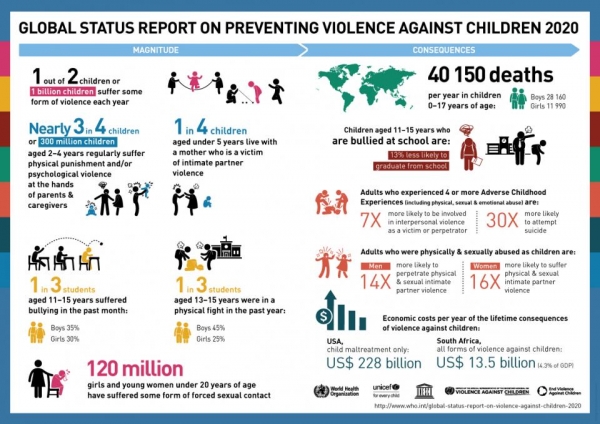The Global Status Report on Preventing Violence Against Children 2020 has published that from 155 recorded countries, only 47 per cent of them are actively enacting their preexisting laws meant to safeguard the lives and rights of children. This is a report collectively published by the United Nations Educational, Scientific and Cultural Organization (UNESCO), World Health Organization (WHO), and the UN Children’s Fund (UNICEF), serving the purpose of evaluating the progress of the renown “INSPIRE framework.” INSPIRE is a plan designated with seven strategies to combat violence towards children.
The report shed light on the current alarming homicide rates against children that are under 18 years of age which in 2017 alone, reached a total of 40,000. Currently, with the onset of the COVID-19 cases spreading across the globe, the enforced lockdowns in educational centers and restriction of movement, have trapped children with their abusers. Henrietta Fore, the Executive Director of UNICEF, emphasized the urgency to ramp up the strategies designated to protect children worldwide. She mentioned that social services personnel must be deemed as essential workers so that the children in danger receive the necessary assistance. The INSPIRE framework is thus seen as functioning with an uneven progress with both positives and negatives. The “access to school through enrollment” plan is the most effective from the seven strategies, noting that 54 percent of the recorded countries reported that an acceptable percentage of children's safety was being effectively monitored through school enrollment. Nonetheless, the report stated that besides the fact that 83 percent of registered countries possess national data on violence towards children, only 21 percent of these countries use the information available to establish guidelines for child abuse prevention. The misuse of this data thus explains why only one-fifth of national governments possess funded plans, or are able to reach objectives in combating child violence.
UNESCO Director General, Audrey Azolay, stated that one of the main targets should be the necessity of addressing violence in the schools. A grand scale of resources need be directed into providing more school counselors, as a response to the amount of physical violence occurring between children. To put in motion an approach that can pave the road to a safer world for children, Special Representative Najat Malla M’jid, mentioned that there needs to be a multisectoral and unified effort deriving from the private sector,national governments, civil society, and even donors. As a critical response, the WHO has vowed to continue its cooperation with the INSPIRE strategies, with the hopes of strengthening its methodology to achieve better results in the near future.
To read more, please visit:
https://news.un.org/en/story/2020/06/1066622
https://www.who.int/news-room/fact-sheets/detail/violence-against-children
Author: Sergio Gomez







